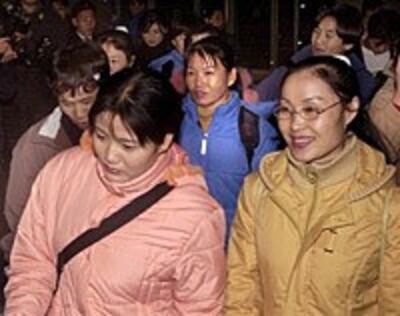
WASHINGTON—Six North Korean defectors have now been accepted as refugees by the Belgian government, and an unknown number is believed to have reached France, after a marathon journey spanning several years and tens of thousands of miles.
“It was hard to survive in North Korea,” a 22-year-old defector surnamed Kim, who arrived in February 2005, told RFA. “My father passed away, leaving me no relatives. So I was afraid I would die.”
Kim said he had no particular plan to come to Belgium but joined a human-smuggling group that was going there.
Aunt suggested Belgium
“My father’s sister was living in China...She arranged my escape and paid for me. My aunt encouraged me to go to a Western country, so I came to Belgium,” he said.
Like most defectors, Kim’s first port-of-call after leaving his homeland was China, where South Korean missionaries and clandestine networks combine to take North Koreans on a dangerous “underground railroad”-style journey to a third, fourth, or even fifth country.
It was hard to survive in North Korea.
Some pass through Vietnam and Thailand on their way to South Korea, while others spend time in Mongolia awaiting resettlement, according to interviews with missionaries working with North Koreans throughout Northeast and Southeast Asia, and with successful defectors in South Korea.
Frank de Neve, public officer with Belgium's Office of the Commissioner General for Refugees and Stateless Persons, said 12 North Koreans had sought asylum in the country between 1993 and the end of 2005. Of the 12, six had been granted political asylum.
Belgium-based interpreter Won Yong-soe said rumors were current among the thousands of North Koreans currently in hiding in China that Belgium was a favored new destination for those seeking resettlement in a third country.
On arriving in Belgium, applicants for political asylum are taken to a reception center for about a month, before undergoing screening interviews for refugee status.
Applicants asked to sing revolutionary songs
Several months later, those who pass the initial screening process are given permanent residency, renewable annually with the authorities.
We know there are North Koreans in France. But also we know that they don't know their rights and they are afraid. It's very difficult to figure out where they are.
Among the tests they must pass include a request to sing North Korean revolutionary songs, including the national anthem, and detailed questions about the education system in the isolated Stalinist state.
“The problem that the Belgian government has to solve is making a distinction between ethnic Koreans from China and North Koreans. In the past many ethnic Koreans pretended to be North Koreans,” Won said.
The Belgian government then provides unemployed North Korean defectors with €625 (U.S.$760) a month in subsistence payments: exactly the same amount received by unemployed Belgians.
Kim, who first left North Korea in 2003, said he was planning to remain in Belgium with its subsidized language training and accommodation, and make a new life there.
“I am attending ...school...The Belgium government is paying for me to go to the school,” said Kim.
North Koreans in France
Activists also believe North Korean asylum-seekers may be hiding in France.
“We know there are North Koreans in France,” Robert Pepin, Paris-based co-founder of the French Committee To Help the Population in North Korea, said in an interview. “But also we know that they don’t know their rights and they are afraid. It’s very difficult to figure out where they are.”
"Most probably they were kidnapped by Chinese people and exported to Europe," said Pepin, who launched his organization with Pierre Rigoulot, co-author of Kang Chol-Hwan's 2001 North Korean gulag memoir Aquariums of Pyongyang.
The group was currently helping a North Korean man prepare his application for political asylum in France, Pepin said.
“France I don’t think has ever accepted political refugees” from North Korea, he said, adding: “I don’t think there would be any problem if any North Korean refugees would ask for political asylum.”
The French Committee To Help the Population in North Korea plans to press for a common resolution on North Korea at the European Parliament in 2006 in a bid to send a stronger signal to Pyongyang on its human rights record, he said.
Original reporting in Korean by Yang Sungwon. RFA Korean service director: Jaehoon Ahn. Written in English by Luisetta Mudie and edited by Sarah Jackson-Han.
